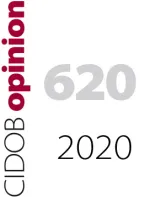Bojo's Coronavirus Fall Out

Boris Johnson’s “revolution” on which he won last December’s election has been completely altered by the Coronavirus crisis. Not only because the Prime Minister who had dismissed it for weeks tested positive, but because the whole Brexit strategy is in deep freeze and when it might be completed is anybody’s guess. Those who believed British should “take back control” have been hit hard by a boomerang of their own making. Covid-19’s invisible hand seems to be guiding us through our collective interest towards a renewal of community.
On Monday 23 March, the British Prime Minister finally achieved gravitas, as he addressed the nation, without his speech sounding like a pastiche of statesmanship. He eschewed any references to the Blitz spirit; Winston Churchill was left out to the relief of millions of listeners who have long tired of Boris Johnson’s rhetorical ornamentation that usually laces phrases with playful insincerity. His anti-authoritarian creed made him reluctant to impose social controls but, by the time he spoke he realised that he could not play this crisis for laughs.
The man who built his career on lies, who likes to be liked so he tells people what they want to hear, this master of politics that makes no demands on citizens, who charmed his way through life by believing that risks are mitigated by debarring them exaggerated met his match. Covid-19 cannot be outmanoeuvred with political chicanery. Ironically it was quick to infect the very man who had dismissed it for weeks, thus putting in peril the lives of many of his countrymen. His comeuppance was a mixture of tragedy and low farce.
The first conclusion to be drawn from this crisis is that Boris Johnson’s “revolution” on which he won last December’s election is vanishing before our eyes: his planned assault on the civil service and the BBC, and the drive for lower taxes are no more. Brexit is in deep freeze and when it might be completed is anybody’s guess. Brexit forced 100,000 nurses and doctors to retreat abroad and the NHS will be all the poorer for their absence. Sixty thousand farm hands are missing: will Britain youth take their place or will this summer’s fruit and vegetable crop go to waste? Those who believed Britain should “take back control” have been hit hard by a boomerang of their own making.
The crisis and its aftermath will absorb all the government’s energy for years to come. If he fails to deliver, Boris Johnson will have to fall on the proverbial sword: the Tory Party is a ruthless power machine. Already facing a reckoning on underfunding the NHS, the Tories will have to throw much more money at it. The political need to protect manufacturing, technology and pharmaceuticals, not to mention farming, will see the return of the notion of national champions. The government will return as a stakeholder. The case for a universal income will be strengthened. Gig workers will be better protected as will others less fortunate socially. The notion of "collective effort” will be more attractive.
The ideological fall out will be huge. The Thatcher Reagan style of liberalism, endorsed in the 90s by Tony Blair, will no longer prevail. Nowhere is this more obvious that in the economy. The UK government has promised loans worth 330bn pound sterling in loans and grants to business and basic pay for those who loose their work during the shutdown. If the state also takes equity stakes in leading companies, it will end up with a share portfolio again, all this after forty years of privatisation, interrupted only briefly in 2008. Some legacies will take years to unwind as the libertarian ideas of philosophers like Ayn Rand are among the chattels that will go up in smoke. This Russian emigrée coined a ruthless philosophy which glorified entrepreneurs rather than their workers and elevated financial relationship not communities’ ties. This fed into the neo-liberal view of globalising corporations as a powerful parallel power base independent of nation states.
The 9/11 attacks and the 2008 financial crisis damaged this ideology but its hold on many leaders in Europe, not least the Tories, remained very strong. In many ways, Covid-19 is today’s invisible hand. Yet, unlike Adam Smith’s invisible hand, where individuals, guided by their own self interest, produced optimal market efficiency, Covid-19’s invisible hand seems to be guiding us through our collective interest towards a renewal of community.
Beyond the ideological and economic consequences of the pandemics, other lessons await us. One drawn from wartime British politics is that government cannot demand endless sacrifice. Politicians must, at one point, turn their minds towards the pay-off after all the blood, sweat and tears. Today that might involve some generational compact to the benefit of younger generations on whose shoulders much of this inflated national indebtedness will fall. A generation compact which combines more sustainable employment, cheaper housing and the avoidance of climate catastrophe might be worth considering.
It was the Labour Party with Clement Atlee not Churchill who seized on the possibilities of the Beverage Report on social welfare published in 1942, paved the way to the National Health Service. How will the forthcoming upheaval play out in politics in Britain and beyond is impossible to say. But the sight of the most right wing government in the UK in eighty years behaving like left wing Labourites is a sight to behold. How Brexit unfolds, how calls for Scottish independence fare, whether Bojo is even in power two or three years from know is anybody’s guess.
Key words: Coronavirus, Covid-19, UK, Boris Johnson, Brexit, pandemics
E-ISSN: 2013-4428
D.L.: B-8439-2012